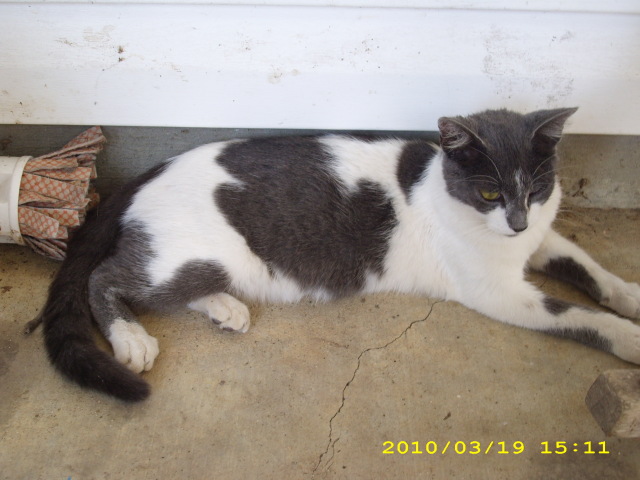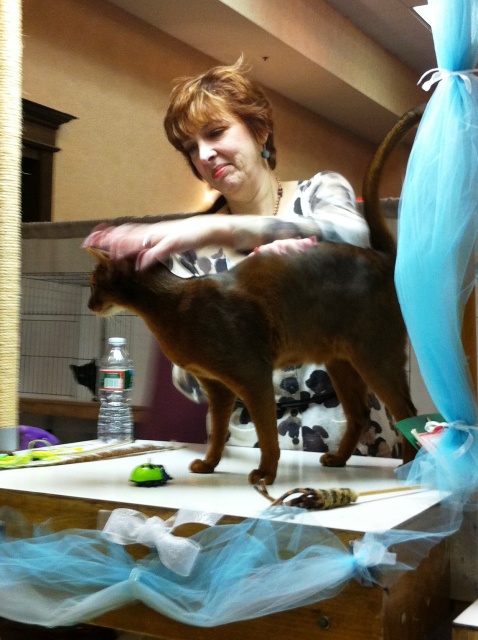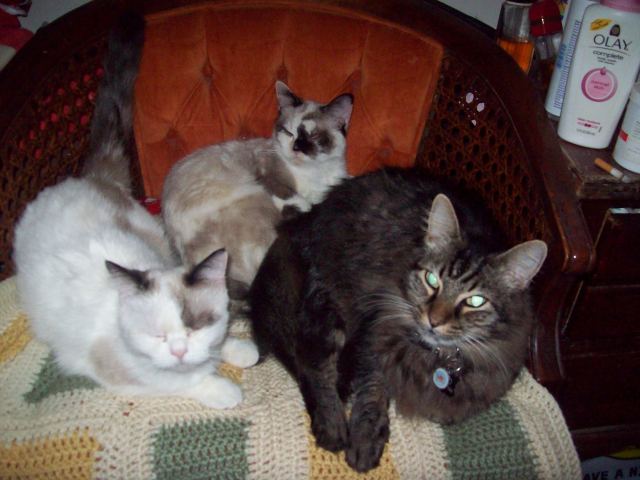QuestionQUESTION: My mom and I have a two month old kitten we just got a couple weeks ago and he's having a diarrhea problem. His crunchies are the same as the crunchies as from his previous home so that isn't the issue. What is the issue is the wet food we have. We also have a three month old kitten that gets three pouches a day along with crunchies. The little two month started to eat the wet food that the three month didn't finish and we're thinking this is what gave him diarrhea. We've stopped the wet food entirely for now and have washed his ass twice today alone. If we don't clean it, he will rub it on the floor, furniture(including the beds and pillows!!), anything else he can.
We're doing our best to keep him hydrated but is there anything else we can do to help? The stink is enough to make you sick and it seems every time he uses the litter box we have to wash his ass. Is there some way to help our little kitten get rid of the diarrhea faster? We're already had to wash the hard wood on the main floor twice and the carpet once and I doubt this is easy on him. Any advice is appreciated.
P.S. he is a ragdoll kitten. I don't know if it makes a difference but I thought I'd include it
ANSWER: Megan,
This kitten could have an intolerance to the type of food he's being fed or his diarrea could be related to stress, parasite or other health issues. It wouldn't be a bad idea to have him assessed by your vet just to be sure that there isn't something medical going on here because young kittens can become very dehydrated very quickly when they've got diarrea. Until your kitten can see the vet it's not going to hurt him to give him small amounts (say 1-2 tsp each time) of plain, unsweetened yogurt (organic if possible) 3-4 times a day - if his digestive system is a bit upset for some reason besides a medical issue the yogurt's natural enzymes will help to replenish his digestive tract's natural enzymes and clear his diarrea up.
It's very important to keep an eye on how hydrated your kitten is and you can do this easily by gently pinching the skin between his shoulder blades and pulling slightly upwards - if the skin snaps back into place quickly he's not dehydrated if it stays up in a roll or takes a few seconds to go down this is a medical emergency, especially in such a young kitten so if this is the case your kitten should see a vet immediately to be rehydrated by receiving IV fluids or fluids given under the skin depending on what the vet finds during his/her exam. Since your kitten does have diarrea it's probably a good idea to confine him to a small, easy to clean room (such as a bathroom) until he's better, but be sure he's got plenty of food, water and a clean litter box available to him at all times - just make sure that you put the food and water on the opposite end of the room from the litter or your kitten may look for other places to relieve himself because nobody wants to eat near their toilet.
Just to avoid habitual mistakes outside of the litter pan it's important that anywhere the kitten has had an accident should be cleaned thoroughly using an enzymatic cleaner such as Petzyme - you can find these cleaners at any pet supply store and they're relatively inexpensive, they work by using natural bacteria to digest stains and odors so that your pet won't have repeat accidents based on being able to smell previous accidents. I usually purchase my Petzyme at Petsmart in the dog section because I can get a larger jug for cheaper than I can in the cat section and it's less heavily perfumed. Petzyme also has instructions for use on bedding in the washing machine if you need them.
Since ragdolls have long fur it may be helpful to have your vet or a groomer clip the fur on his back end until he's better because he won't end up with loose stool caught in his fur which will force him to try and remove it by wiping his backside on surfaces you'd prefer he wouldn't. I would also suggest that you consider checking out www.catinfo.org - this is a website created by a veterinarian to help pet parents understand the unique nutritional needs of their feline companions. If you have any further cat related questions or concerns, please feel free to contact me again - I'm happy to help you and your kitten in any way that I can.
---------- FOLLOW-UP ----------
 Eli
Eli
QUESTION: I have checked to see how hydrated he is and it goes back in place instantly. He drinks plenty and eats his crunchies.
One thing I noticed after I sent the first question was that he sleeps a little more often than before. Before he was just a little ball of energy attacking our older kitten's tail. He still does this but I find him napping more often than usual. I know his schedule pretty well; he sleeps with me until 6-9am (depending when my mom starts moving around), between 1-3pm he has a nap with our other kitten, and then around 7-9pm he gets on my bed and sleeps until I go to bed around 3am, he crashes around for another hour before settling back down and sleeping.
Now he takes his afternoon nap around noon and gets on my bed around 6pm and doesn't always get up when I go to bed. Should I be worried or will this clear up when the diarrhea does?
This may sound like a stupid question, but is there a better brand of yogurt to give him that is better than others? Do I just give it to him in a bowl like I do his food or do I force feed him it?
AnswerMegan,
The fact that the kitten is sleeping more than he was before is also a worrying sign, it sounds like he's sick. He really should see a vet as soon as possible. In the meantime you can give him any brand of yogurt you like - I prefer to go with an organic one, but they can be a bit pricey sometimes. If your kitten will eat his yogurt from a dish then that's how you should give it to him, if not you can use an oral syringe (you can find these in the baby section of any pharmacy) to give it to him.
Regards,
Ali


 My cat, Spots
QuestionQUESTION: Hi. My cat Spots is a wonderful cat.
My cat, Spots
QuestionQUESTION: Hi. My cat Spots is a wonderful cat.
 My cats gone missing
Question
Tommy
Hi Jessica,
I do hope that you c
My cats gone missing
Question
Tommy
Hi Jessica,
I do hope that you c
 What is the breed of my cats
Question
1st
Hello Ali
Thanx for giving us time to get
What is the breed of my cats
Question
1st
Hello Ali
Thanx for giving us time to get
 Best weight-loss plan for Abyssinians?
Question
Overweight Aby?
I have a year and 10 month old
Best weight-loss plan for Abyssinians?
Question
Overweight Aby?
I have a year and 10 month old
 Litter Box Behaviour
Question
All Kitties
Hello!
Im writing to you fo
Litter Box Behaviour
Question
All Kitties
Hello!
Im writing to you fo